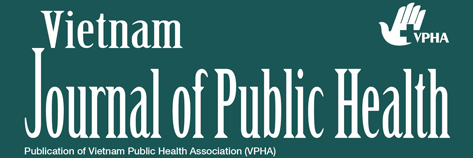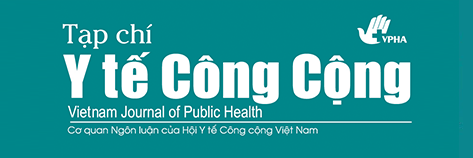Preference and willingness to pay for using treatment diet services at Hanoi Medical University hospital in 2018 - 2019
Abstract
Background: An appropriate nutrition diet assists patients to increase the effectiveness of medical treatments, reduce relapse, prevent disease progression, shorten the duration of treatment and reduce medical expenses. In Vietnam, treatment diet services have been concerned at the early stage and implemented among some hospitals but its performance did not widespread and highly effective.
Methodology: A cross-sectional study, direct interview with questionnaires on 220 inpatients being treated in 4 clinical departments, namely Department of Internal Medicine, Department of Cardiology, Department of General Surgery, and Department of Oncology and palliative care, in Hanoi Medical University Hospital.
Result: The proportion of patients used to using treatment diet was 48.2%.The percentage of respondents want to use treatment diet was 54.95%. There was 54.95% of respondents were willing to pay for treatment meal services with the mean amount of 35,100 VND (95% CI, 31,950 VND-38,240 VND. Comparing to males, more females were willing to pay for the treatment meal services (63.29%) but at a lower mean amount (30,800 VND) and the difference among two groups was statistically significant (p<0.05). Respondents aging from 18 to under 60 were willing to pay at a higher mean amount than those aging 60 and above (37,690 VND and 31,950 VND respectively).
Conclusion:
The proportion of patients who want to use treatment diet is high. Strengthen communication exchange with leaders, doctors, nurses, patients and family members to increase the proportion of patients use treatment meal over 70% according to the Ministry of Health standards.
Keywords
Full Text:
PDFReferences
Weimann A, Braga M, Carli F, et al. ESPEN guideline: Clinical nutrition in surgery. Clinical Nutrition. 2017;36(3):623-650. doi:10.1016/j.clnu.2017.02.013
Lorraine S Young, Pham Thi Thu Huong, Nguyen Thi Lam, et al. Nutritional status and feeding practices in gastrointestinal surgery patients at Bach Mai Hospital, Hanoi, Vietnam. Asia Pacific Journal of Clinical Nutrition. 2016;25(3). doi:10.6133/apjcn.092015.15
Berneis, Battegay, Bassetti, et al. Nutritional supplements combined with dietary counselling diminish whole body protein catabolism in HIV-infected patients: Nutritional intervention in HIV-infected patients. European Journal of Clinical Investigation. 2000;30(1):87-94. doi:10.1046/j.1365-2362.2000.00591.x
Mahakalkar C, Modi S, Yeola M, Kaple M, Patwardhan M, Laddha P. Malnutrition in hospitalised patients; a real concern in surgical outcomes. Int J Res Med Sci. 2014;2(1):250. doi:10.5455/2320-6012.ijrms20140248
Hoyt KJ, Sarkar S, White L, et al. Effect of malnutrition on radiographic findings and mycobacterial burden in pulmonary tuberculosis. Rottenberg ME, ed. PLoS ONE. 2019;14(3):e0214011. doi:10.1371/journal.pone.0214011
Tran Chau Quyen, Jongjit Angkatavanich, Tran Van Thuan, Vo Van Xuan, Le Danh Tuyen, Do Anh Tu. Nutrition assessment and its relationship with performance and Glasgow prognostic scores in Vietnamese patients with esophageal cancer. Asia Pacific Journal of Clinical Nutrition. 2017;26(1). doi:10.6133/apjcn.122015.02
Tobert CM, Hamilton-Reeves JM, Norian LA, et al. Emerging Impact of Malnutrition on Surgical Patients: Literature Review and Potential Implications for Cystectomy in Bladder Cancer. Journal of Urology. 2017;198(3):511-519. doi:10.1016/j.juro.2017.01.087
Wyszynski DF, Perman M, Crivelli A. Prevalence of hospital malnutrition in Argentina. Nutrition. 2003;19(2):115-119. doi:10.1016/S0899-9007(02)00925-5
Kang MC, Kim JH, Ryu S-W, et al. Prevalence of Malnutrition in Hospitalized Patients: a Multicenter Cross-sectional Study. J Korean Med Sci. 2018;33(2):e10. doi:10.3346/jkms.2018.33.e10
Sartorelli DS, Sciarra EC, Franco LJ, Cardoso MA. Beneficial effects of short-term nutritional counselling at the primary health-care level among Brazilian adults. Public Health Nutr. 2005;8(7):820-825. doi:10.1079/PHN2005737
Molenaar EA, van Ameijden EJ, Vergouwe Y, Grobbee DE, Numans ME. Effect of nutritional counselling and nutritional plus exercise counselling in overweight adults: a randomized trial in multidisciplinary primary care practice. Family Practice. 2010;27(2):143-150. doi:10.1093/fampra/cmp104
Waitzberg DL, Caiaffa WT, Correia MITD. Hospital malnutrition: the Brazilian national survey (IBRANUTRI): a study of 4000 patients. Nutrition. 2001;17(7-8):573-580. doi:10.1016/S0899-9007(01)00573-1
Nguyen HV, Trinh NB, Le HT, et al. Preference and willingness to pay for nutritional counseling services in urban Hanoi. F1000Res. 2017;6. doi:10.12688/f1000research.10974.2
Rowe RD, D’Arge RC, Brookshire DS. An experiment on the economic value of visibility. Journal of Environmental Economics and Management. 1980;7(1):1-19. doi:10.1016/0095-0696(80)90018-2
Lori P. Montross-Thomas, P., Emily A. Meier, PhD, Kimberly Reynolds-Norolahi, RN, LAc,, D. Erin E. Raskin, LAc, Daniel Slater, MD, Paul J. Mills, PhD, and M. Lauray MacElhern, and Gene Kallenberg, MD. "Inpatients' Preferences, Beliefs, and Stated Willingness to Pay for Complementary and Alternative Medicine Treatments." ALTERNATIVE AND COMPLEMENTARY THERAPIES 184-189



